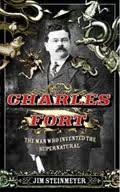[url=]Charles Fort – Jim Steinmeyer[/url]
PDF
Posted by Greg at 02:46, 03 May 2008
We all grew up hearing those "believe it or not" tales of spontaneous combustion, frogs and fish falling from the sky, and other strange phenomena. Most of the general public don't know, however, that these impossible anecdotes originated not from scientific studies, but from the research of one man: Charles Fort. Spending untold hours in libraries, scanning newspapers and journals for strange happenings, Fort's work was so groundbreaking and far-ranging that these phenomena are now known by the simple appellation, 'Fortean'. [url=] [/url]However, while the word Fortean may be well-known, even appearing in the Oxford dictionary, the man himself remains a mystery to most.
[/url]However, while the word Fortean may be well-known, even appearing in the Oxford dictionary, the man himself remains a mystery to most.
Publishing house Tarcher Penguin have gone a long way to remedying this oversight however, with the simultaneous release (in the U.S.) of two books which – together as a compendium – offer a wonderful path to understanding more about the origins and subject matter of Forteana: Jim Steinmeyer's biography Charles Fort: The Man Who Invented the Supernatural (Amazon [url=]US[/url] and [url=]UK[/url]), and the anthology The Book of the Damned: The Collected Works of Charles Fort (Amazon [url=]US[/url] and[url=]UK[/url]). The latter is made up of Fort's four best-known books – Lo!, New Lands, Wild Talents, and the Book of the Damned – and features an introduction by Steinmeyer as well.
One can't underestimate the task Jim Steinmeyer takes on in telling the life story of the "mad genius of the Bronx". An intensely private man, Fort spent most of his adult life researching in libraries, writing at home, or relaxing with his wife Annie – hardly the makings of a cracking read. But if you can make [url=]the Statue of Liberty[/url] disappear – Steinmeyer is a renowned magical designer and historian, whose credits include the invention of David Copperfield's famous New York illusion – then illuminating the life and works of this one, strange American man shouldn't be too much of a step up.
He accomplishes this task through the words of the man himself. Using autobiographical notes, book excerpts and correspondence, Steinmeyer explores the harsh childhood Fort endured, his growth into a career in journalism and writing, and the formation of personal philosophies related to Monism – seeing connections between all things – and yet at the same time an exceptional skepticism of anything orthodox or authoritarian. Even when Fort began (unintentionally) attracting his own 'devotees' – the Fortean Society – he felt the urge to poke fun at the institution:
We have a new cult. The Forteans are now very old-fashioned. They're three months old, and that is long enough for any cult. We are the Neo-Forteans.
While the odd subject matter of Fort's books is often seen as their selling point, Steinmeyer's biography also shows that his searing wit and ability to enlighten through satire (depending on the openness of the reader, of course!) were equally formidable assets contributing to his success. His insights attracted the friendship, and virtual patronage, of writer Theodore Dreiser. Steinmeyer pivots much of his book on the relationship between Fort and Dreiser – alike in so many ways, and yet at times seemingly separated by a vast gulf. Using correspondence between the two to illustrate reaction and counter-reaction in discussing various philosophical points, we get a picture of a man who literally lives for the exploration of new, heretical ideas.
Steinmeyer's book also portrays a man wary of being consumed by his interests. Fort collected many tens of thousands of short notes throughout his life and research, which he fastidiously catalogued and stored. And yet, on at least a few occasions, Fort felt compelled to destroy them – an act that must have taken some extraordinary will (or foolhardiness). Moments such as these are the ones that best illustrate Charles Fort, and Jim Steinmeyer does well to bring them to our attention.
I would only offer a few criticisms of Steinmeyer's biography. Occasionally the timeline skips around without clarification, most often when a future event is referenced in illustrating a point – without a reference point for where Fort's life currently is, this creates a little confusion about the period being discussed. Also, there are a few short passages about apparent paranormal manifestations in Fort's life, but there is no further exploration of this side of things – something that may have helped add some fitting high strangeness to the biography. This may be no fault of Steinmeyer's however, as his knowledge of these events may be limited to the resources at hand. Lastly, Charles Fort: The Man Who Invented the Supernatural is more hagiography than biography. Fort was no doubt a wonderful literary and –[url=][/url]dare I say it – scientific figure – but he also had his foibles, and in his speculation and criticism got some things terribly wrong. While I certainly would not like to see a CSICOPian character assassination, this biography could have done with more deconstruction of the perils of combining biting satire while sitting on the periphery of orthodox thought.
As for Fort's writings, Tarcher's anthology The Book of the Damned is a worthy companion to Steinmeyer's biography (and both books are beautifully packaged). Personally, I've always struggled to read Fort's work for long periods. Fort's prose tends to jar the mind with staccato, dissonant chords, rather than long melodies of harmony and counterpoint. However, he does possess a brilliant turn of phrase – he can illumine as much in one short passage of vitriolic satire than most writers can achieve in a chapter. And one of his underlying themes – of the 'untouchable' nature of science – seems remarkably prescient in terms of the current prevalence of fundamentalist skepticism and the 'new atheism' – the ugly dichotomy of "with us or against us" religious or scientific faith. Instead, Fort walked the line between:
…Poor old theology hammered around, but Science the great Immune. And as far as I know, mine are about the only books of impoliteness to scientific dogmas written by one who has not the theological bias. Every now and then I get a letter from somebody who thinks I am some kind of Fundamentalist, simply because I don't take in, without questioning, everything that scientists tell us. But I think I made it plain in the books that I am not out to restore Moses.
In navigating the limbo between religious and scientific faith, Fort did well to not lose his way as many others have done. In his early manuscripts X and Y, we get the sense of the typical 'New Age' personality – seeing strange things, constructing elaborate theories around them and then wanting to proselytise to the world at large. If Fort had of continued in this vein, he probably would have disappeared into the pages of history without even a footnote. However, with The Book of the Damned Fort matures as a writer and person. As Steinmeyer describes:
His breakthrough seems to have been a daring agnosticism that teased his readers and gave a mysterious, haunting quality to his accounts. The previous formula for "crank" books had been to doggedly gather observations and assign them to a grand theory: X continually postulated a race on Mars; Y tied its facts together by speculating on a continent concealed at the North Pole. In contrast, long stretches of The Book of the Damned seemed content to be damnable, and nothing but damnable. Instead of assembling his data to support a theory, he treated these oddities like his characters in The Outcast Manufacturers – releasing them in front of his audience and then stepping back to watch them perform; whispering suggestions in the reader's ear, playing the master of ceremonies with an occasional wry comment or observation.
This is the great value in the writings of Charles Fort – exploring without imposing, teasing but not insulting. And in case anyone wants to take it all too seriously, Fort himself cautioned: "I believe nothing of my own that I have ever written." Such an attitude betrays not just satirical wit, but also a truly skeptical mind. Jim Steinmeyer and Tarcher Penguin have done us a great service in bringing this complex personality out of the shadows of history.
Bookmark/Search this post with

